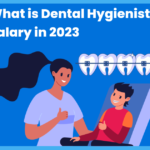HOW TO become a good dental hygienist, IN this blog post we discuss about dental hygienist education requirements Below.
Dental hygienists play a pivotal role in maintaining oral health and avoiding dental problems; we cover everything related to becoming one and training requirements – how to become one, selecting programs appropriate to your needs, salary expectations, and job outlook are just a few topics we cover!
How to Become a Dental Hygienist
To become a dental hygienist, you must complete an academic training program and acquire your license. Here are the educational requirements:
High School Diploma or GED?
Before enrolling in a dental hygiene program, a high school diploma or GED is necessary for admission. Having a solid foundation in science and math would also prove valuable.
Associate’s Degree in Dental Hygiene.
Most dental hygienists hold an associate’s degree in dental hygiene from an accredited program that typically lasts two years and offers both classroom instruction and hands-on clinical experience.
Dental Hygiene Studies can lead to a Bachelor’s Degree.
Some dental hygiene programs offer bachelor’s degree programs as an option, which could be ideal if you wish to pursue leadership or research roles within this industry.
Bachelor’s programs generally take four years to finish.
Licensing Requirements
All dental hygienists must obtain licensure in the state where they work. Licensing requirements vary by state but generally consist of completing an accredited education program and passing written and clinical exams for licensure.
Locating an Appropriate Program to Meet Your Dental Hygienist Education Requirements
When it comes to selecting the best dental hygiene program that is in line with your goals in the field and educational requirements it is essential to conduct a thorough study and then make an educated choice.
Here are a few key aspects to think about that will help you to make the right decision for the future of your life:
Program Accreditation: One of the first steps in your decision-making process should be to verify that the dental hygiene program you’re considering is accredited by the Commission on Dental Accreditation (CODA).
Accreditation by CODA ensures that the program adheres to rigorous quality standards, setting you on the right path for licensure and opening doors to various employment opportunities in the dental healthcare sector.
Duration of the Program: Take some time to evaluate the length of the program and decide which option best suits your needs and lifestyle.
Are you looking for a quicker entry into the workforce with a two-year associate’s degree, or are you more interested in a comprehensive education that a four-year bachelor’s degree offers? Weigh the pros and cons of each to determine what aligns with your career objectives.
Hands-On Clinical Experience: Look for programs that offer substantial hands-on clinical training as part of their curriculum.
This practical experience is invaluable, as it allows you to apply the theoretical knowledge you’ve gained in a real-world setting. It not only boosts your confidence but also better prepares you for the challenges you’ll face in your professional life.
By considering these essential factors, you’ll be well-equipped to select a dental hygiene program that not only meets your educational requirements but also sets you up for a successful and fulfilling career in this high-demand healthcare field.
Compare Cost, and Determine Lending/Financial Aid Needs
Evaluate various programs’ costs before making decisions regarding loans or financial assistance needed to cover them.
What to Expect and Education Requirements as a Dental Hygienist Salary: Expected Amount and Details on Work Experience
Dental Hygienists enjoy an impressive salary for such short education requirements. According to the Bureau of Labor Statistics (BLS), their median annual wage was $77,090 as of May 2020.
Dental Hygienist Job Outlook: Education Requirements and Employment Prospects
Dental Hygienists should have an optimistic job outlook with projected employment increases of 6 percent between 2019-2029, according to the Bureau of Labor Statistics (BLS).
This sunny forecast can be attributed to factors like an aging population who maintain their natural teeth longer and a greater focus on preventive healthcare services.
Dental hygienists work across settings like private dental practices, public clinics, or even hospitals – with employment increasing substantially for this profession in all those instances.
Continued Education Is Crucial for Dental Hygienists
Continuing education for dental hygienists is critical to staying abreast of current research, techniques, and technologies in their field.
Many states mandate continuing education hours each year as part of licensure requirements and create potential career advancement opportunities within this profession.
Are You Exploring Dental Hygiene as a Path to Career Advancement?
Earning a bachelor’s degree can be an excellent way for dental hygienists to advance their careers and increase job prospects and salaries while broadening career options and providing more flexibility.
An associate degree usually serves as the minimum education requirement to become a hygienist, but obtaining one could open doors that lead to excellent job opportunities, increased salaries, and greater career flexibility.
One of the primary advantages of earning a bachelor’s degree in dental hygiene is how it will set you apart in a competitive job market.
Many employers prefer hiring dental hygienists with bachelor’s degrees for positions such as public health research.
Furthermore, this level of education allows individuals to advance to more senior roles within a dental practice, like clinical coordinator or office manager.
An additional advantage of earning a bachelor’s degree in dental hygiene is increased pay.
According to the Bureau of Labor Statistics, median annual wages for dental hygienists averaged $76,220 as of May 2020. However, bachelor’s and associate degrees tend to make more.
Are You Thinking about Pursuing a Bachelor’s in Dental Hygiene? There are various programs designed specifically to accommodate dental hygienists with existing associate degrees and students starting fresh.
Traditional on-campus and online programs are both options that offer flexible scheduling that allows completion.
How to Acquire Dental Hygienist Licensure: Requirements and Steps
Before becoming a dental hygienist, one must obtain licensure from their state.
Although licensure requirements differ between states, in general, you will need to complete an accredited dental hygiene program, take and pass both written and clinical board examinations, and fulfill any additional state-specific criteria.
Step one toward licensure as a dental hygienist is completing an accredited dental hygiene program. Most take two to three years and combine classroom study and clinical sessions. While in your schedule, you’ll cover topics like oral anatomy, pharmacology, and radiology.
After graduating from your dental hygiene program, you must pass the National Board Dental Hygiene Examination (NBDHE) to obtain licensure.
The NBDHE is an in-depth written exam encompassing topics related to patient assessment, periodontal therapy, and community health – everything needed for successful licensure!
Some states also mandate dental hygienists pass an additional dental hygiene board exam: this typically entails showing off your scaling and root planing capabilities on an actual patient during this examination.
Once you’ve fulfilled all education and examination requirements, licensure applications may be submitted through your state dental board.
Along with an application fee payment, any applicable documentation, such as transcripts or test score reports, as well as any state-specific rules, may also need to be included with this submission.
Take Control of the National Board Dental Hygiene Examination With These Study Tips
The National Board Dental Hygiene Examination (NBDHE) is an extensive written exam covering various dental hygiene topics.
Passing it is required in most states to be licensed as a dental hygienist, although preparing can be daunting. Here are a few study tips which might help.
One effective strategy for passing the National Board Dental Hygiene Examinations (NBDHE) exam is reviewing its content outline from the Joint Commission on National Dental Examinations (JCNDE).
This outline details all topics included in this test, so your study efforts can be targeted accordingly.
THANK YOU FOR READING THIS BLOG TILL HERE


